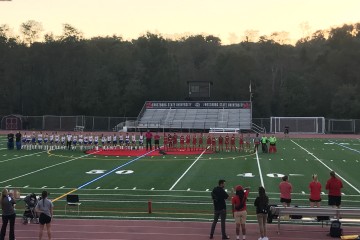FSU’s Legislative Outreach in Full Swing
On Wednesday, Feb. 22, the Frostburg State University (FSU) Alumni Association hosted a legislative reception “celebrating the accomplishments and future vision of Frostburg State University,” according to the program’s flyer. The reception was held in Annapolis at the Miller Senate Office Building, home to the Maryland State Senate. During the evening, legislators of the Maryland General Assembly, which includes the Senate and House of Delegates, were able to attend and interact with FSU faculty, staff, students, and alumni.
The legislative reception comes during the heart of the General Assembly’s annual session, which lasts from January through early April. Dr. John Bowman, FSU’s interim vice president for International and Government Affairs, recently sat down with The Bottom Line to discuss the institution’s government relations efforts. Bowman, a tenured political science professor who formerly served as vice provost, explained that, “Overall [university administrators] try to build strong connections with government and community leaders who are important to the growth and prosperity of the university.”
The recent legislative reception sought to do just that, connecting a diverse array of individuals with close ties to the institution with Maryland legislators. Attendees included Del. Mike McKay and Del. Wendell Beitzel, members of the the Western Maryland legislative delegation that represents Garrett County and Allegany County. Also in attendance were two FSU alumni who represent other regions of the state in the House of Delegates. Del. Carol Krimm, who represents Fredrick County, graduated from Frostburg State and was born and raised in Cumberland, MD. Del. Antonio Hayes earned his B.S. in Political Science from FSU in 2000, and now represents Baltimore City. Several representatives from Governor Larry Hogan’s office were also present.
The reception opened with remarks from FSU Foundation President Mary Clapsaddle, who expressed her appreciation to all in attendance, and emphasized the value of the institution actively engaging with legislators. She then introduced FSU President Dr. Ronald Nowaczyk, who addressed the reception and highlighted some of the school’s greatest accomplishments in recent months. Nowaczyk also recognized the many current FSU student in attendance, including Student Government Association members and several students currently serving as interns at the General Assembly. Every spring semester, the J. Glenn Beall Institute for Public Affairs places Frostburg students in internships at the state legislature.
So far during the spring 2017 General Assembly session, FSU has been especially active in Annapolis both individually and as a member of the University System of Maryland. President Nowaczyk has traveled to Annapolis on multiple occasions as part of his ongoing testimony to the legislature in support of the university’s operations budget and capital budget, according to Bowman. University administration is hopeful that the General Assembly will pass additional planning funds for the school’s next academic building, a new Education and Health Sciences facility. Meanwhile, local government leaders have been actively involved in FSU’s current strategic planning process, which is set to conclude this semester.
According to Bowman, the university’s government relations work is a ongoing team effort, carried out throughout the year by everyone from the university president to students volunteering in the community. He noted that government relations does not focus solely on state legislators, but also must engage local civic leaders. “The university and the City of Frostburg care about each other, and we work together to see what can be done to promote both the school and the local community,” Bowman said.
Bowman also explained the mission of the institution’s legislative outreach, which engages government officials ranging from the Frostburg City Council to Congress, as “Communicating with officials to share what Frostburg State University faculty, staff, and students are doing, as well as communicate our long-term needs and goals.” He added that, “FSU is committed to meeting regional needs, including educational, economic, and workforce needs.” He noted that in order to continue to meet these needs, the school must work with officials to grow the institution and the region together.
Ultimately, Bowman stressed, the key to successful government and civic outreach is growing partnerships between the university and community leaders. To that end, he emphasized, events like the recent Annapolis reception are significant because partnerships first stem from positive relationships. As Frostburg State University finalizes its new strategic plan this spring, strong positive relationships between university administrators, community leaders, and government officials will be paramount to the continued growth and success of the institution.



